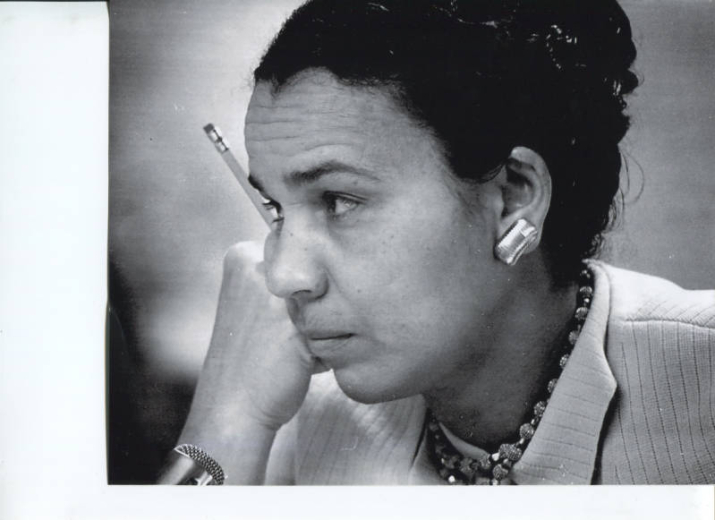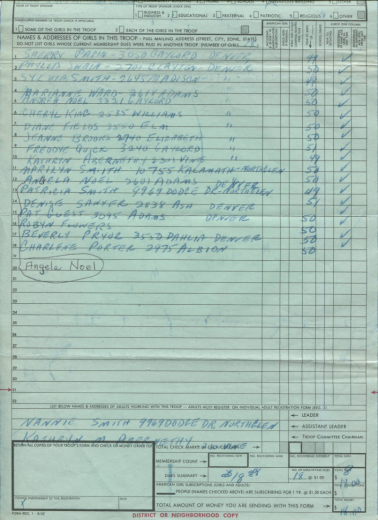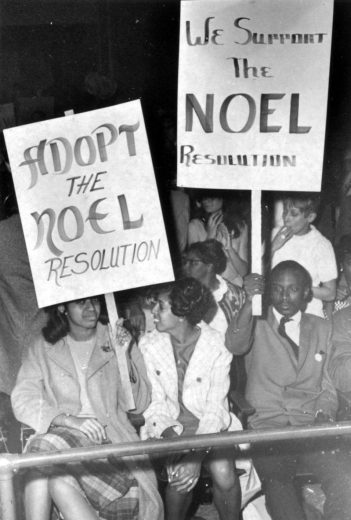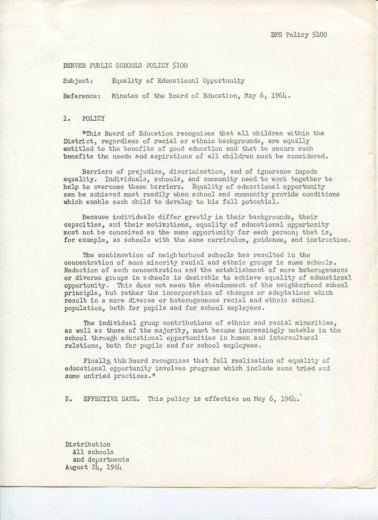A pioneer in education, Rachel Noel helped integrate the Denver Public School system and provide equal opportunities to all Denver students.
Rachel Bassette was born in Hampton, Virginia on January 15, 1918. She was part of an important and accomplished African American family.
Rachel's grandfather was a former slave who became a lawyer. In 1895, he founded one of the first schools for African American children.
Rachel's father was a successful lawyer, and her mother was a teacher. Rachel's mother was college educated at a time when very few women of any race held a college degree, and her father and grandfather were some of the first African Americans to study law.
From her family, Rachel learned that education was the key to success regardless of background. This lesson stayed with Rachel her entire life.
Rachel earned a degree in Education from Hampton University, where she graduated at the top of her class. She then traveled to Tennessee to earn a masters degree in Sociology from Fisk University.
Rachel knew she wanted to help people, and especially help people achieve their dreams through education. After she finished her masters degree in 1940, Rachel traveled to Washington, D.C. to work in a home for troubled girls.
Rachel married a physician named Edmond Noel in 1942. They met while Rachel was earning her masters and Edmond was in medical school. They married just before Dr. Noel was sent to serve in World War II. Rachel Bassette changed her name to Rachel Noel after the wedding.
While Dr. Noel was at war, Rachel returned to Fisk University, where she worked as a researcher exploring race relations.
In 1949, Edmond Noel accepted a position as staff physician at Rose Medical Center in Denver. He became the first African American doctor to work in a Denver hospital.
Rachel looked for a new job in Denver, but was turned down from many positions because of her race. After several unsuccessful years of searching, in 1955 Rachel was offered a position at the Denver Human Rights Commission.
The Noels lived in the African American Five Points neighborhood for their first few years in Denver. They moved to the mostly white Park Hill neighborhood when their son and daughter were school age because Rachel preferred the schools in Park Hill to those in Five Points.
The Noels were one of only a few African American families in Park Hill, and sometimes ran into problems with their white neighbors.
Rachel's daughter was not allowed to join the white neighborhood Girl Scout troop, so she and another African American mother founded Troop 508 for minority girls. Rachel helped integrate the Girl Scouts in Colorado.
Rachel was very involved in the Parent Teacher Association at Park Hill School. In 1960, she was surprised to learn that her daughter would be transferred to Barrett Elementary School, even though Park Hill School was closer.
Rachel soon discovered that Barrett Elementary was small, cramped, and made up entirely of African American and Hispanic students. The quality of education was much lower than her children had at Park Hill School. Barrett had outdated, secondhand textbooks and inexperienced teachers.
Rachel's son was sent to a middle school with almost entirely minority students, and she again found that the school he was sent to was of a much lower quality than the junior high white Park Hill children attended. The same thing happened when her son entered high school in 1962. African American and Hispanic students were sent to Manual High School, while white students were sent to East High School.
Rachel realized the district must be redrawing the lines of attendance to segregate minority children into lower performing schools, while white children were sent to much better schools in the same neighborhood. She knew she needed to do something to change this.
In 1965, Rachel ran and was elected to the Denver Board of Education. She was the first African American on the Denver Board of Education, and the first African American woman to hold public office anywhere in the State of Colorado.
Rachel began an investigation into the segregation of schools in Park Hill and throughout Denver. Her committee found that the Denver Public Schools followed what was known as de facto segregation.
This meant that while no specific laws existed to make white and minority students attend different schools, the boundaries for school districts were redrawn as needed to make sure white and minority students were separated.
Rachel met Dr. Martin Luther King, Jr. during one of his visits to Denver, and was inspired by his message of peaceful protest.
While Rachel wanted to improve education for minorities, she did not want to overthrow the entire school system. However, when Dr. King was assassinated in April of 1968, Rachel realized she needed to do something more drastic.
Later that month, Rachel introduced Resolution 1520 to the Denver Board of Education. Commonly called the "Noel Resolution," Resolution 1520 explained the findings of Rachel's committee, and called for an immediate end to de facto segregation in Denver.
The Noel Resolution recommended closing some of the overpopulated schools for minorities, and instead integrating students into quality schools across the city.
It also called for textbooks which talked about minority people in history. Before 1968, most Denver textbooks only focused on the achievements of white Europeans and Americans.
The Noel Resolution was violently protested by many white Denverites. Rachel received calls and letters claiming she, her husband, and her children would be hurt or killed if schools were integrated.
Rachel did not let this stop her from pushing for integration of Denver schools. "If we let the bigots have their way," she warned, "Denver will move toward an apartheid society."
Denver students were much more supportive of the Noel Resolution. When parents gathered to protest the resolution, over 200 high school students of all races formed a counter-protest to show their support.
The Denver School Board passed the Noel Resolution in January 1969, but it was quickly repealed in June 1969 when a new School Board took office.
Many parents were angry that the Noel Resolution was repealed so quickly. They felt it showed that Denver Public Schools wanted to segregate students all along.
An African American chiropractor named Wilfred Keyes organized a group of parents to sue the school district for discrimination. This case made it all the way to the United States Supreme Court.
Dr. Keyes had his house bombed, but he continued with his case. Rachel also continued to have herself and her family threatened, but she supported Wilfred Keyes.
In 1973, the Supreme Court ruled that in the case of Keyes v. School District 1, Denver, Denver Public Schools were clearly guilty of de facto segregation. The Supreme Court also found that the schools for minority students were far worse than schools for white students.
The Supreme Court called for Denver schools to integrate immediately. When this did not happen, the Supreme Court ordered a program of mandatory busing to force schools to integrate.
This meant that equal numbers of minority students were sent by bus to "white" schools, and equal numbers of white students were sent by bus to "minority" schools. Denver was the only city outside of the American South to require integration by court-ordered busing.
People were so angry over busing that the Denver Public Schools bus depot was bombed as well, destroying anywhere between twenty and thirty buses. Busing remained in place in Denver until 1995.
Neither Rachel nor Wilfred Keyes introduced or promoted busing for integration, but as Rachel later said, "If it took a bus to do it, then so be it."
When Rachel's term on the Board of Education ended, she decided she would not run again. She accepted a position as professor of African American Studies at Metropolitan State University in Denver, and eventually became head of the department.
In 1976, a member of the University of Colorado Board of Regents passed away unexpectedly with fifteen months left in his term. Governor Richard Lamm appointed Rachel to take over his position, making her the first African American on the Board of Regents.
Rachel ran against twenty-two opponents to keep the position in 1978, and won by a large majority. She served as Chair of the Board of Regents, the first woman of any race to hold that office.
Rachel continued to work as a consultant for Denver Public Schools, and was an advocate for equal education and opportunity throughout her life. She served as a commissioner for the Denver Housing Authority, and was the head of the Black Advisory Committee under Mayor Pena.
In 2007, Rachel moved from Denver to Oakland, California to live with her daughter Angela. She passed away in her sleep on February 4, 2008 at the age of ninety.
Rachel earned many statewide and national honors for her work to bring equality to Colorado.
In 1981, Metropolitan State University began the Rachel Noel Visiting Distinguished Professorship. This was a program to bring top African American researchers, artists, and politicians to teach at Metropolitan State University, and still continues today.
Rachel won the 1985 American Civil Liberties Union of Colorado Award, and the 1990 Martin Luther King, Jr. Humanitarian Award. In 1996, Rachel was made a member of the Colorado Women's Hall of Fame, and in 2000 the Rocky Mountain News included Rachel on its list of Top 100 Citizens of the 20th Century. In 2004, Rachel won the Anti Defamation League's Civil Rights Award.
The Rachel B. Noel Middle School was named for Rachel in 2004. When the school closed in 2012, the Rachel B. Noel Community Arts School, which serves middle and high school students, was opened later that same year.
The Colorado State Capitol in Denver has a stained glass window with a portrait of Rachel Noel.
There is still a lot of work to be done to bring equality to schools, but leaders throughout the United States continue to be inspired by Rachel's dedication to giving all students the same opportunity.
As Rachel herself said, "I have a deep faith that if you're right, you don't give up. And that's what I felt - that I was right, and somebody had to stand up."
race relations - the study of how different races and communities interact within a certain country
integrate - to bring different races together into equal participation in a society or group
segregate - the separation of people of different races into different schools, neighborhoods, etc.
de facto segregation - segregation that is not publicly stated, but that happens anyway
drastic - something unheard of or radical that will have a long-lasting effect
bigot - a person who is intolerant of and cruel to people of different backgrounds or different opinions
apartheid - a strict racist system in place in South Africa between 1948 and 1993 in which minorities were not allowed to interact with or be equal to whites in any way
repeal - to legally take back a law or political decision
chiropractor - a person who treats patients who are sick or in pain by moving their joints and spine
Supreme Court - the highest and most important court in the United States.
mandatory - required by law or rules, not optional at all
consultant - a person who gives expert advice to an organization or group
advocate - a person who publicly recommends a group or policy
If you lived in Denver in 1968, how would you react to the Noel Resolution? How is it different from the way people reacted at the time?
Why do you think some people were against the Noel Resolution?
Are there things that need to happen in your community to make people more equal?
- If so, what are they?
- If not, why not?
Who are some other Civil Rights leaders you have learned about? How is Rachel similar? How is she different?
Rachel Noel Manuscript Collection (primary sources including letters, photographs, speech drafts, and more belonging to Rachel Noel. The Rachel Noel collection can be viewed in person at the Blair-Caldwell African American Research Library.)
Biography Clipping Files (newspaper articles about Rachel Noel that can be viewed in person at either the Blair-Caldwell African American Research Library or on the 5th Floor of the Denver Central Library)
Rachel Noel in the Denver Public Library Digital Collections
Books about Rachel Noel at the Denver Public Library:
- Growing Up Black in Denver (biographies of several famous Denver African Americans, including Rachel Noel)
- Women of Consequence: The Colorado Women's Hall of Fame (biographies of Colorado Women's Hall of Fame members, including Rachel Noel)
Rachel Noel in the Colorado Women's Hall of Fame
Biography and Interviews with Rachel Noel at The Historymakers
Biography of Rachel Noel from Metropolitan State University Denver
Learn: Race and Busing in Colorado (interactive timeline from Rocky Mountain PBS)




